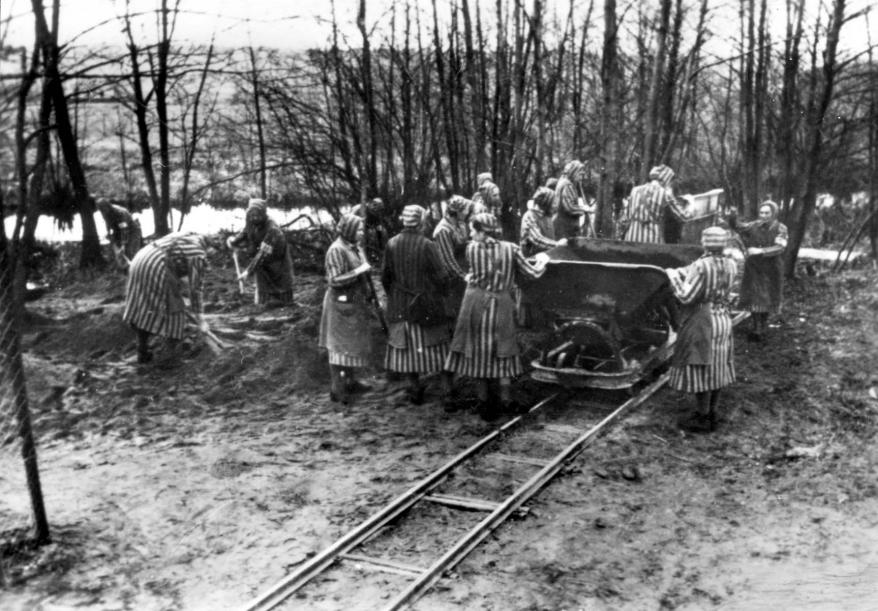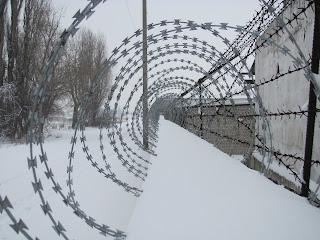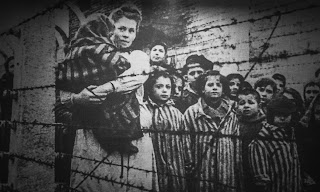While I have read many books about the Holocaust and Historical Novels, this one really made me feel what our young Helena was going through. The Nazis were always looking for ways to make their lives even more miserable than they already were. Food was scarce and watery soup kept many alive even though there was little or no nutrition in that food. Money could not buy your safety or help meet any of your needs. Sickness and starvation were a fact of life.
Wednesday, June 11, 2025
The Ruins in Which We Bleed ~ A Book Review
While I have read many books about the Holocaust and Historical Novels, this one really made me feel what our young Helena was going through. The Nazis were always looking for ways to make their lives even more miserable than they already were. Food was scarce and watery soup kept many alive even though there was little or no nutrition in that food. Money could not buy your safety or help meet any of your needs. Sickness and starvation were a fact of life.
Wednesday, April 19, 2023
To Dream of Shadows ~Steve N. Lee ~ A Book Review
To Dream of Shadows is a book that I could not put down. While I love many different types of novels, I find that I have been drawn to those that take place before/during and after the Second World War.
I know there is a fascination with all that went on during that time and I'm sure that having had family in the European world during that horrific time, makes those novels seem to come alive for me.
It was a horrible time in our history for sure. Given what we know now about the atrocities that took place during that time, but, we also hear of immense heroic acts as well.
Even though the German army was the perpetrators of many of these terrible deeds, there were those who used their rank to undermine the intentions of the Nazi party! Just think of Schindler's List as one of those!
To Dream of Shadows falls into that category of book. While the Nazi's were the POWER , many of the people who found themselves in positions within the Reich, really thought that the intention of the labor camps was to make the workforce (they were not humans) productive for the needs of the Reich. To be sure, these individuals were totally deluded in their thinking. The Reich did not care about productivity of their workforce (Jews were replaceable), as much as it cared about showing the Jews who was in power and yielding that power without consideration for anything humane or decent. The Germans did not think that the Jews were human, they were less than the family dog! They were there to be dominated, made to feel less than dirt! Their main use was being worked death or on really bad days, being used for the entertainment of the officers! They would find all kinds of ways to make a Jew suffer for their very sordid amusement. When morality gives way to power, all manner of abuse is possible and some of these officers devised ways that were so horrific that even today we get the chills at the thought of what was happening in those prison camps.
Even in these terrible circumstances, the light of hope is never extinguished. There will always be hope and that is what author Steve N. Lee uses to drive this story. Hope in the midst of every possible horror and dehumanizing situation, can keep the strong willed alive!
From the time of her incarceration at 18, Inge has been relocated away from her family to a hellhole of a war prison. Not knowing what has happened to the rest of her family, Inge undergoes all manner of deprivation. Starving and being worked almost to death, she finds her inner strength with the hopes of liberation. But can there be hope right here in the midst of this prison?
Heinz, aka as Rudi, one of her captors and an SS Sergeant, has been fed the lies about the Jews since childhood. He never questions what is happening right before his eyes until he falls in love with one of the prisoners and begins to see that they are just as human as he is.
He becomes a bright light in a very dark place, trying to make things better for all those captives. But his intentions do not go unnoticed by others in the rank and file, at the prison. Turning in one of their own (who is helping the enemy) would mean extra honors for them. Heinz needs to watch his back as his subordinates are getting concerned about his treatment of their "subjects/prisoners".
Can he get out of this squalid place with the prisoner that he adores? He and Inge can be put to death in a heartbeat if their relationship becomes public. It is a forbidden love and the consequences of this union could result in death for both of them.
What can be done? You will have to read this book and see what happens. Just be ready to hold your breath in anticipation.
Steve N. Lee has done a masterful job in retelling this story and I know if you are anything like me, you will have a hard time putting this book down. Suffice it to say this could make a great movie along the lines of Schindler's List and maybe open your eyes to what the human spirit is capable of when love is the driving force.
***All pictures used in this blog post come from Pixabay, thank you!
Wednesday, October 9, 2019
Corrie ten Boom, Tramp for the Lord: A Review
 |
| I took the photo of the book cover from my own copy and added the quote. |
Released from Ravensbrück with a Message for the World
Corrie ten Boom's family worked for the Dutch Resistance when the Nazis occupied their land of Holland during World War II. Corrie wrote of their activities and their consequences in her first book, The Hiding Place.Until she was fifty years old, Corrie had lived with her family above the watch shop her father owned. After the Nazis took power, the ten Boom family helped hide persecuted Jews in a specially built hiding place in their home. But an informer betrayed them. The Nazis arrested and imprisoned the entire family.
Corrie's father died after a few days. Some family members were released. But Corrie and her sister Betsie were sent to Germany and imprisoned in the Ravensbrück women's labor camp for several months, where Betsie died. A clerical error caused the Germans to release Corrie a week before all the women her age were sent to the gas chambers.
 |
| Bundesarchiv, Bild 183-1985-0417-15 / CC-BY-SA 3.0 [CC BY-SA 3.0 de (https://creativecommons.org/licenses/by-sa/3.0/de/deed.en)] |
While imprisoned, Corrie and Betsie had tried to encourage those who had lost all hope. The picture above shows the kind of work these women in Ravensbrück did. The photo above was taken at Ravensbrück a year before Corrie was imprisoned there. This link leads to more photos taken of the prisoners in this camp and their life there. You can see why most had little hope. Most did not leave while alive. They saw the smoke from the crematoriums as they worked. Could anything be more depressing?
In The Hiding Place Corrie explains how God was able to work among the women--even in the barracks of the concentration camp. The book was made into a movie. I recommend it. I saw it when it first came out in 1975.
Billy Graham Presents: The Hiding Place [DVD]
Corrie's Life After Release
After her miraculous release, for I believe God was behind that clerical blunder, Corrie spent some time regaining her health and reconnecting with the remnants of her old life in Holland. Then, for about twenty more years, she traveled the world spreading her message of God's love and forgiveness. She called herself a tramp for the Lord because she circled the world twice, living out of a suitcase, with no real home to call her own. I call her an ambassador for Christ, for she carried his message of reconciliation wherever she went. She chose the title for her book because it reflects her lifestyle during those years. It is the sequel to The Hiding Place.Book: Tramp for the Lord
Corrie's Message Was Consistent
Corrie had suffered hardship and betrayal. She had watched as her sister died due to conditions in the concentration camp, illness, and the cruelty of a particular guard. She had slept with fleas and lice. She had almost starved to death. But still she spoke of God's love and faithfulness to her.
During nightly Bible times in the barracks, she gave hope to many women without any. She had managed to sneak a Bible in and she used it for spiritual strength for herself, Betsie, and anyone else who wanted to participate. (That story is in this book.)
Corrie's message was one of reconciliation. She told stories as she shared the convicting and healing words of the Bible. One of her most frequent themes dealt with the bitterness that many have when they believe they have suffered injustice or betrayal. She taught that the cure was forgiveness. On p. 59 she says, "If we forgive other people, our hearts are made ready to receive forgiveness."
But God has a way of testing us so that we will know ourselves. Corrie was not exempt from that testing.
One night Corrie spoke about God's forgiveness at a church in Munich. She had told the assembled Germans that when we confess our sins, God casts them into the deep ocean and they are gone forever.
And then she saw a man approaching her in an overcoat and a brown hat. Except she suddenly saw him as she had known him before -- in a blue uniform and a visored cap with a skull and crossbones. The man had been one of the most cruel guards at Ravensbrück. As he thrust his hand out he said it was good to know all his sins were at the bottom of the sea. He seemed not to recognize Corrie. He told her he'd been a guard there, but had become a Christian now.
He said, '...I know that God has forgiven me for the cruel things I did there, but I would like to hear it from your lips, as well....will you forgive me?' Out came his hand again.
All Corrie's memories of the terrible times and the way her sister died flooded her mind. Corrie wrote: "And I stood there--I whose sins had again and again to be forgiven--and could not forgive."
She wrestled with God internally over the hardest thing He had ever asked of her. She wrote "For I had to do it--I knew that. The message that God forgives has a prior condition: that we forgive those who have injured us. 'If you do not forgive men their trespasses,' Jesus says, 'neither will your Father in Heaven forgive your trespasses.' I refer you to Chapter 7 in Tramp for the Lord to see what happened next.
 |
| I took the photo of the book cover from my own copy and added the quote. |
She continued to trust him on a daily basis as she traveled the world as a tramp for the Lord. He remained faithful in providing her needs until her death on her 91st birthday in 1983. When she said "He made me rich" she didn't mean materially rich. He supplied all her needs so she would not have to ask for money. He gave her peace, forgiveness, and the victory that comes with obedience.
Tuesday, May 7, 2019
My Real Name Is Hanna Book Review
Historical Fiction Aimed At A Young Adult Audience
 |
| Pysanky Eggs play a roll in My Real Name Is Hanna (image courtesy of pixabay.com) |
Captivating Story Not easy to put down
A Story of Survival: My Real Name is Hanna
Most Recent Reviews on Review This Reviews
Search for Reviews by Subject, Author or Title
The Review This Reviews Contributors
 Sylvestermouse
Sylvestermouse Dawn Rae B
Dawn Rae B MbgPhoto
MbgPhoto Brite-Ideas
Brite-Ideas Wednesday Elf
Wednesday Elf Olivia Morris
Olivia Morris Treasures by Brenda
Treasures by Brenda The Savvy Age
The Savvy Age Margaret Schindel
Margaret Schindel Raintree Annie
Raintree Annie Lou16
Lou16 Sam Monaco
Sam Monaco
 Cheryl Paton
Cheryl Paton Renaissance Woman
Renaissance Woman BarbRad
BarbRad Bev Owens
Bev Owens BuckHawk
BuckHawk Decorating for Events
Decorating for Events Heather426
Heather426 Coletta Teske
Coletta Teske MissMerFaery
MissMerFaery Mickie_G
Mickie_G
Review This Reviews is Dedicated to the Memory of Our Beloved Friend and Fellow Contributor
We may be apart, but
You Are Not Forgotten






.jpg)


